Contribution to SDGs
Measures for a Sustainable Future
The foundations of ID&E’s business lie in resolving social issues from a long-term perspective. Since our establishment, we have utilized, from both tangible and intangible aspects, our diverse and talented human resources with their sound track record, proven skills and specialized knowledge. This has enabled us to expand our comprehensive consultancy services globally, while enriching lives. As we move toward 2030, we are also contributing to the attainment of all 17 Sustainable Development Goals (SDGs) of the United Nations.
Top Commitment SDGs and innovation
Throughout the world, emerging countries and developed countries alike are striving for zero emissions and the construction of smart cities to achieve sustainable societies. In step with this trend, the United Nations is promoting its Sustainable Development Goals (SDGs), which cover activities in 17 different areas. Looking at the ID&E Group’s businesses, we can see that we are already contributing in various ways to achieving all of these SDGs.
In NK-Innovation 2021, we aim to flexibly incorporate the SDGs into our businesses, and make them a common language for behavior within the Company. In other words, we will adopt the SDGs, a global lingua franca, in our day-to-day work as the platform of our business, and maintain an attitude of making better proposals by keeping in mind how each project will contribute to achieving the SDGs. We believe that we should accurately gauge the position of our projects in the relationships between various issues, and mobilize our technologies to solve those issues.
To realize this kind of value creation, we added “innovation” to the title of the new medium-term management plan. Looking at the future environment, open innovation will become the norm, and we will need to strongly promote new combinations of technologies and knowledge both in and outside the Company, in addition to existing frameworks. As a concrete first step, we will focus on establishing a one-stop marketing system. The five business segments and the ID&E Group overall will cooperate to build a marketing platform that is capable of responding to diverse market needs, and will acquire new customers by leveraging that platform.
Ryuichi Arimoto
Living with Dignity
Based on the fundamental philosophy of the SDGs, which is ensuring that “no one will be left behind,” we contribute to the development of social and economic infrastructure that improves lives. We formulate plans, implement projects, and conduct project management toward the solution of issues confronting developing countries, such as food security, living environment and labor, so that all people can live with dignity. We propose optimal technologies and development methods while respecting the characteristics of each country and region, providing comprehensive consulting solutions aimed at achieving sustainable and autonomous development.

Sustainable Regional and Industrial Development
Since our founding, ID&E has been engaged not only in building infrastructure such as power plants, dams, and roads, but also in developing local industries that utilize such infrastructure, and in technology transfer to local engineers. Furthermore, we implement projects that employ local people, goods, and other resources, thus contributing to the sustainable development of local regions in ways such as creating employment and contributing to economic growth.

Sustainable Cities and Communities
By incorporating aspects of both civil engineering and architecture, and providing comprehensive solutions that are also environmentally friendly, we bring about the creation of rich urban spaces and improved resilience. In the fi eld of disaster prevention, we contribute to people’s lives by proposing measures to prevent and mitigate river and landslide disasters overseas based on afforestation and flood control technologies developed in Japan. We provide consulting services on project operation and management, and help reduce human and economic loss from natural disasters.

Coexistence with a Rich Natural Environment
We analyze the causes and mechanisms of marine pollution and forest degradation, develop infrastructure aimed at lessening and rectifying these issues, help preserve the diversity of forests and living things, and improve and optimize methodologies related to conservation activities.

Promotion of Development and Use of Clean Energy
To help create a low-carbon society that reduces global warming, we have gained a deep understanding of the characteristics of elements such as water, wind, and sunlight, as well as how they are interlinked with society. In countries and regions around the world, we are engaged in the development, management, and monitoring of clean energy that is in harmony with nature. We are also involved in building business models related to the bilateral credit system,*1 REDD*2, and payment for ecosystem services as well as technology development and providing consultancy services.
- *1A mechanism to facilitate diffusion of advanced low-carbon technologies in developing countries as well as the implementation of global climate change mitigation measures. It can also be used to quantitatively evaluate Japan’s contributions to GHG emission reductions, while using those evaluations to help achieve Japan’s emission reduction targets.
- *2An initiative to reduce deforestation and forest degradation and promote sustainable forest management in developing countries

Development of Healthcare and Education
To help develop the infrastructure for medical and educational systems that support the lives of all people, we provide a wide range of consulting services such as for the introduction of systems, development of frameworks, and sharing of knowledge. We also provide support for the foundations of maternal and child health, and basic education in developing countries from both tangible and intangible aspects.

Turning Diversity into Strength
ID&E’s business now spans more than 160 countries and regions. We collaborate and cooperate with diverse local stakeholders from a wide range of social backgrounds, including business partners, administrative organizations, experts, and communities. We provide consulting services on creating harmony, the empowerment of women and gender mainstreaming, in addition to consulting services on CSR and sustainability to Japanese corporations operating overseas. We harness the diverse societies and cultures of various countries and regions as our strengths, build partnerships and contribute to the attainment of the SDGs.

ID&E × SDG Challenge
ID&E Projects Contributing to the SDGs
Railway Rehabilitation Project in Cambodia
The civil war in the 1970s completely devastated the railway infrastructure in Cambodia. The Cambodian railway rehabilitation project restored existing railway devastated by the civil war during the Pol Pot regime and due to insufficient repair and maintenance. ID&E handled everything from planning to supervision of project construction for the entire 649 km which included 264 km of the southern line from Phnom Penh to Sihanoukville as well as 385 km of the northern line to the border of Thailand.
As a result of more than a decade of support, this project not only connected the cities of Cambodia via railway but also realized of cross-border operation into Thailand for the first time in 45 years. The rehabilitation work even removed all of the land mines buried along the railway during the civil war, which helped to ensure a safer environment across roughly 649 ha of the region.
| Quantitative Results | Restoring a Safe Environment Along 649 km/649 ha of Railway |
|---|---|
| Contract period | January 2006 to October 2018 |
| Main SDG Targets | 9.1 11.a 11.2 11.7 3.6 |

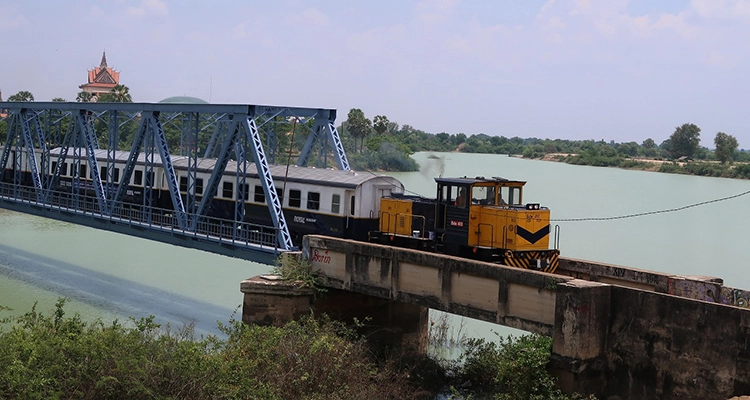
Rengali Irrigation Project in India
The Rengali Irrigation Project aims to improve agricultural productivity in the Indian state of Odisha, which has persistently low unit grain crop yields on average relative to the rest of India despite abundant water resources and some 90% of its cultivated land area able to accommodate irrigation.
The project expands the land area for irrigation and planting in the Brahmani River region of Odisha, organizes irrigation associations and provides agricultural guidance. ID&E worked with Group company NK India to provide technical support related to construction of the irrigation facilities as well as assistance for organizing irrigation associations and providing agricultural guidance. This irrigation project addresses key issues in various ways, such as helping improve farm income and the preparation of social infrastructure to reduce poverty. The initiatives increase and diversify agricultural production as well as improve farm income in Odisha.
| Quantitative Results |
|
|---|---|
| Contract period | July 2016 to July 2023 |
| Main SDG Targets | 1.1 1.2 2.1 2.3 2.4 |

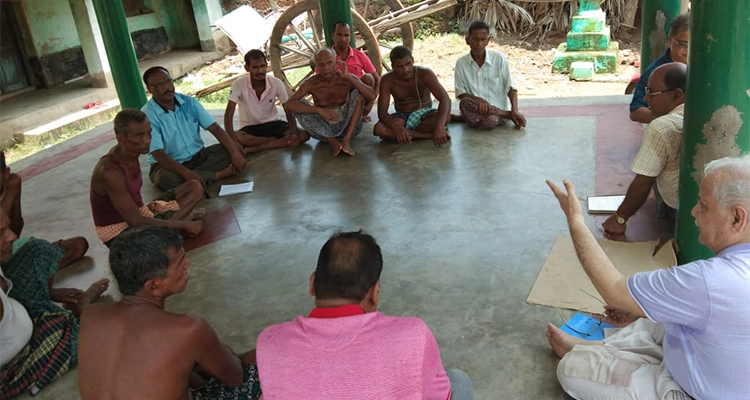
Darfur Three State Peace Building Project in Sudan
The Darfur Three State Peace Building Project is pursuing measures to help the over 1.7 million Sudanese people who have no choice but to live in camps for Internally Displaced Persons (IDP) in Darfur, Sudan due to armed conflicts and environmental degradation issues in recent years.
Koei Research & Consulting Inc., a ID&E Group company, took part in the pilot project to strengthen government service capabilities and systems for health, water and employment centers in three states of Darfur, Sudan.
The sector of health and water established agreements between community health and water committees, selecting female committee members and ensuring speaking opportunities for all relevant communities (total 54 communities). The employment centers positioned training for women as a key field in the Darfur vocational training policy and formulated training plans for women in each state.
This provides public services tailored to the needs of the local people while at the same time improving trust in the local state government by enhancing administrative capabilities of the local state governments.
| Quantitative Results |
|
|---|---|
| Contract period | April 2017 to December 2020 |
| Main SDG Targets | 5.c 3.c 6.b 8.6 16.6 |
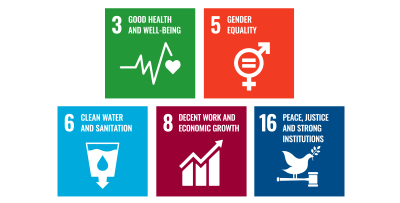
Project to Investigate Measures to Combat Invasive Vegetation at Otaki Dam
The project drafted overall extermination and prevention plans for extermination work of invasive plant species (Madagascar ragwort and Lance-leaved tickseed) living in and around the Otaki Dam reservoir in the Yoshino district of Nara prefecture, considering the growth characteristics of relevant introduced species and the conversion of vegetation after extermination (promoting a shift to locally native plants).
Sustainable management methods able to be done by dam administrators after formulation of the plans not only became a local model project but the materials used to convert the vegetation also took advantage of native seedlings that could be harvested in the project area (downy ground fern, etc.), local topsoil, and chips of dam driftwood (finely crushed wood drifting to the dam) to conserve the environment and cut costs.
In addition, the work helped coexistence with the local people from the conservation of seedlings planted as a measure to prevent damage by deer feeding which had been a challenge in the respective region to the creation of materials to raise awareness about the region.
| Quantitative targets | The extermination work will continue for three years after the initial three-year preparations (initial extermination and conversion of vegetation from 2019 to 2021) to eliminate non-native vegetation by 2024. Plan scope: 60 areas (2.1 ha) Priority areas: 11 locations (Over 1000 plants/location) |
|---|---|
| Contract period | October 2018 to March 2019 (6 months) |
| Main SDG Targets | 15.8 15.a |






